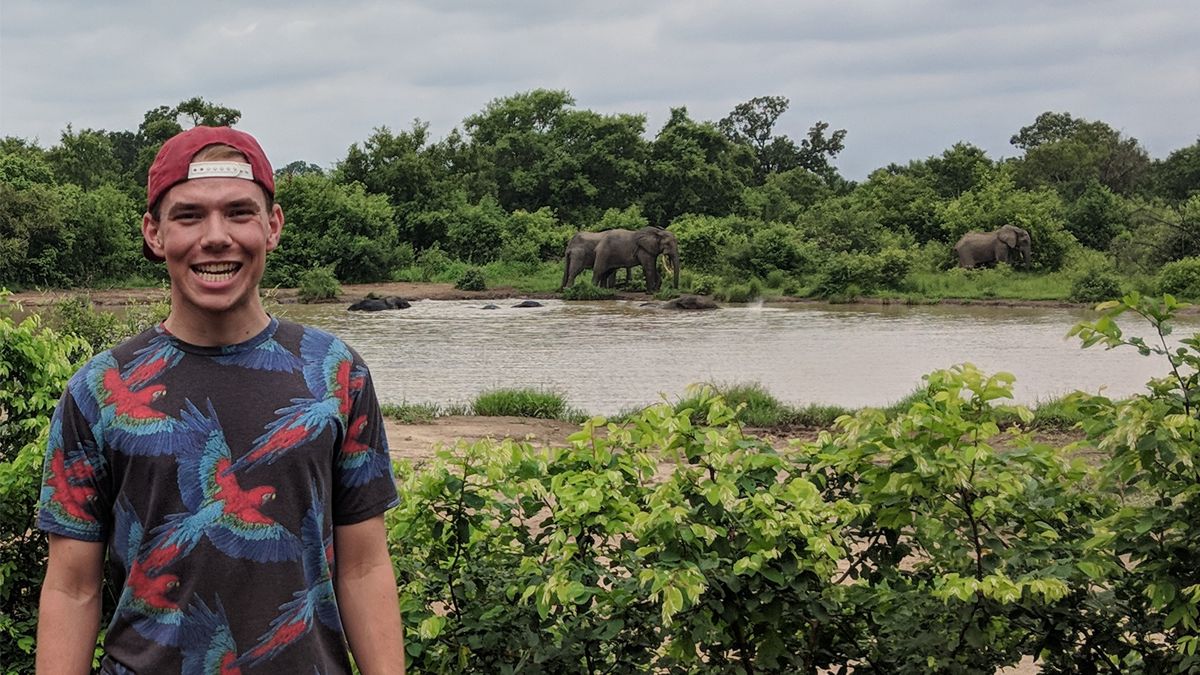
UAlberta mechanical engineering student Austin Zacharko is putting on thousands of kilometres this year gaining valuable international learning experiences. Seen here during his summer placement with Engineers Without Borders in Ghana, Zacharko is spending the 2018 fall term on a research placement at the University of Sydney, Australia.
(Edmonton) You can't deny that Austin Zacharko is squeezing everything he can from his engineering studies. So far this year he has spent four months on a work term with Engineers Without Borders (EWB) in Ghana, and now he's starting a research placement in Australia at the University of Sydney.
It proves his point that going to university "is all about discovering what you're passionate about and gaining experience."
That was the thinking behind applying for a junior fellowship with the University of Alberta chapter of Engineers Without Borders. After being selected for the position, Zacharko spent a week in Toronto with EWB learning about the organization and cultural practices-then spent the next four months in Ghana's capital city, Accra.
His job for the summer was to work with the GhanaThink Foundation, helping the organization measure the impact of training sessions it provides to entrepreneurs aged 18 to 30.
"One of the programs they host is called Barcamp Ghana," he said. "It's an 'unconference' where they aim to get young entrepreneurs together to collaborate and share ideas, and to motivate and equip them with skills and tools."
Zacharko learned about some important cultural practices around technology and communication. Surveying BarCamp participants by sending the email surveys and questionnaires delivered very poor results. For a nation of wired, tech-savvy people, this method of communication was largely ignored.
"A big issue for me was understanding cultural differences. Everyone will talk to you forever in person but going through e-mails or direct messaging is very time intensive and a lot of people don't really reply," he said.
"Getting that data from people who had been at conferences is challenging-it's hard to go out see a few thousand people in person. In Canada we can send out a Google form to 1,000 people and have half of them fill it out. In Ghana, you'd probably get two per cent of the people responding."
Another key cultural difference was the work environment itself. The GhanaThink Foundation has no offices. Staff interact virtually. Zacharko was based at a co-working office space in Accra. The only time he and his colleagues from the foundation met in person was during the Barcamp sessions.
Technology and interconnectedness were themes of Zacharko's work term. At one point he took pains to visit a remote village, where houses are built on stilts-in a lake. Even there, the villagers are part of the wired world, playing video games via the Internet.
Zacharko said that by the time he returned to Edmonton, he still hadn't completely processed his summer experience.
"It really exploded my brain a little bit," he said. "The work I did wasn't technically engineering, but the skills and qualities I developed there were focused on communications-how to effectively communicate and how to work with a diverse team-which although it may not be technically related, those skills are important in any job.
"A bigger perspective is that living there allowed me to really understand the issues developing nations face."
With the help of a Queen Elizabeth Scholarship and the U of A Study Abroad program, the mechanical engineering student is now spending the fall term in a research job at the University of Sydney, Australia.
Zacharko is interested in a career in renewable and sustainable energy, and at the U of S he will be studying the way physical structures affect microclimates in cities.
"It's a really interesting area of study because it looks at how engineering affects people's perception of their own comfort-and it is also related to my goal of eventually doing a master's degree. It will lay a strong foundation in research and understanding the methods of academia."